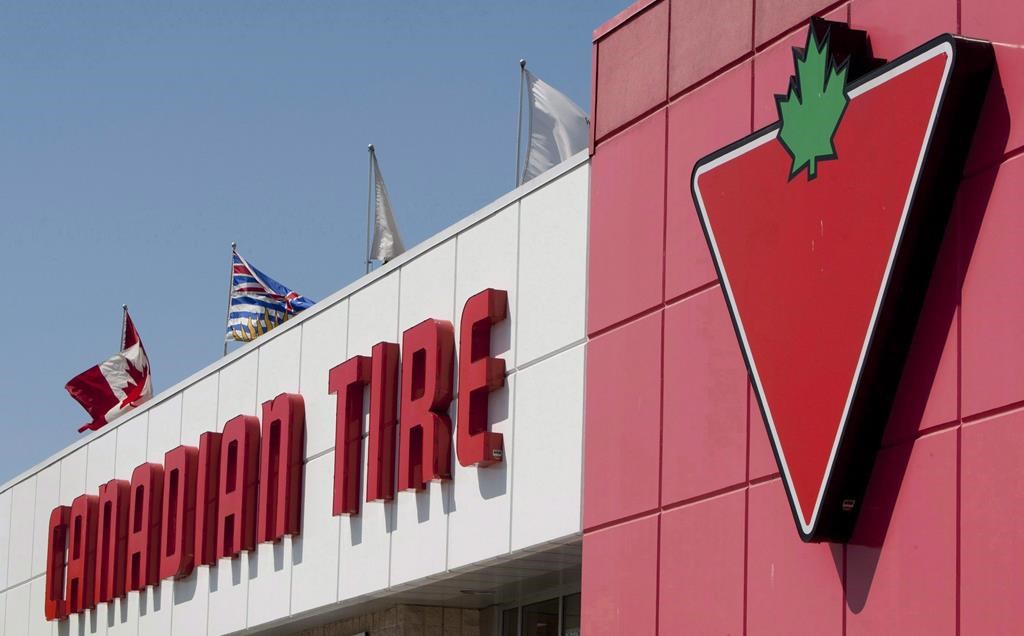Canadian Tire Corp. Ltd. is ordering spring and summer products early and chartering its own cargo ships to import goods as it doubles down on an inventory strategy that’s buoyed the retailer through the pandemic.

The company’s approach has helped it work around bottlenecks at ports and avoid surging spot market shipping rates, keeping store shelves stocked amid shortages elsewhere.
“We’ve once again chartered a dedicated ocean vessel and we’ve contracted it for the entire year,” president and CEO Greg Hicks said Thursday during a conference call.
“It gives us greater control over the supply chain and limits shipping peaks, which would otherwise expose us to spot market freight rates.”
The company has also contracted an additional three charter sailings in its current quarter, he said.
It’s unclear how much added shipping costs could affect the company’s gross margins and store prices in 2022.
Statistics Canada said Wednesday prices for goods rose 7.2 per cent in January compared with a year ago, up from 6.8 per cent in December.
At Canadian Tire, Hicks said higher prices are “moving on to the customer” but that the retailer won’t “give an inch competitively.”
Meanwhile, the company is also ordering goods early in an effort to sidestep ongoing hiccups across the supply chain.
“Given the ongoing and significant supply chain challenges, we are continuing to build lead times into our supply chain processes as we assume that from sourcing to arrival at our distribution centres orders will take longer than in previous years,” Hicks said.

Get weekly money news
The retailer, which operates multiple stores including Canadian Tire, SportChek, Mark’s, PartSource and Pro Hockey Life, is also betting big on its own brand names.

The retailer’s in-house brands, such as Noma, Canvas, Sherwood and WindRiver, made up 40 per cent of the retailer’s total sales in its most recent quarter.
Canadian Tire expects rising inflation and supply issues will continue to favour those store brands.
“Across the North American retail industry, scarcity of inventory and pricing have led to a tremendous amount of brand switching by customers and private labels have benefited from this trend,” Hicks said.
The retailer also benefits from an assortment that can fit to customers budgets, he said.
“Over 90 per cent of our assortment at (Canadian Tire retail) has a consumer price point of under $50, which represents 50 per cent of our sales,” he said.
TJ Flood, president of Canadian Tire retail, added that the stores are focused on offering products at every price point.
“We take great pride category-by-category making sure that we offer consumers choice at the good, better and best price levels,” he said.
Meanwhile, sales of Christmas, automotive and hockey products bumped up Canadian Tire’s fourth-quarter profit and revenue and capped a record year for the nearly 100-year-old retailer.
“We successfully anticipated the wants and needs of our customers who were facing another Christmas spent at home while also considering the needs of those getting back on the road and back to the rink,” Hicks said.
The company topped expectations as it reported a net income attributable to shareholders of $508.5 million or $8.34 per diluted share for the quarter, up from $488.8 million or $7.97 per diluted share a year earlier.
Revenue for the 13-week period ended Jan. 1 totalled $5.14 billion, up from $4.87 billion in the 14-week period ended Jan. 2, 2021.
In addition to a robust supply chain and in-stock inventory, the company’s stores also benefited from strong e-commerce sales reaching $500 million in the latest quarter.
“We’ve invested in lockers at stores and technology to help our dealers pick and pack faster,” Flood said.
Canadian Tire store sales rose 3.4 per cent and comparable sales gained 9.8 per cent, while sales at SportChek added 5.8 per cent and comparable sales gained 15.9 per cent. Sales at Mark’s rose 9.6 per cent as comparable sales rose 15.0 per cent.
On a normalized basis, Canadian Tire said it earned $8.42 per diluted share, up from a normalized profit of $8.40 per diluted share a year earlier. Analysts on average had expected a profit of $6.70 per share and $4.76 billion in revenue, according to financial markets data firm Refinitiv.
Chris Li, an analyst with Desjardins Capital Market, said the company’s outperformance at the retail level was particularly impressive given it was being compared against a strong quarter from the previous year and had one fewer week of operations.
“The strength was driven by healthy consumer demand, strong execution and the in-stock position,” he said in a client note.







Comments